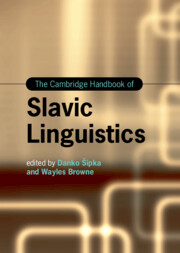Book contents
- The Cambridge Handbook of Slavic Linguistics
- Cambridge Handbooks in Language and Linguistics
- The Cambridge Handbook of Slavic Linguistics
- Copyright page
- Contents
- Figures
- Tables
- Contributors
- Introduction
- Part 1 Prosody and Phonology
- Part 2 Inflectional and Derivational Morphology
- Part 3 Syntax
- 13 Agreement
- 14 Wh-Constructions and Wh-Dependencies
- 15 Coordination and Subordination in Slavic Languages
- 16 Numerals and Quantity Expressions
- 17 Placement and Ordering of the (En)clitics
- 18 Secondary Predication
- 19 Negation and Polarity
- 20 Null Subjects
- 21 Voice
- 22 Morphosyntactic Reflexes of Information Structure
- Part 4 Lexicon
- Part 5 Sociolinguistic and Geographical Approaches
- Part 6 Experimental and Quantitative Approaches
- Name Index
- Subject Index
- References
22 - Morphosyntactic Reflexes of Information Structure
from Part 3 - Syntax
Published online by Cambridge University Press: 16 May 2024
- The Cambridge Handbook of Slavic Linguistics
- Cambridge Handbooks in Language and Linguistics
- The Cambridge Handbook of Slavic Linguistics
- Copyright page
- Contents
- Figures
- Tables
- Contributors
- Introduction
- Part 1 Prosody and Phonology
- Part 2 Inflectional and Derivational Morphology
- Part 3 Syntax
- 13 Agreement
- 14 Wh-Constructions and Wh-Dependencies
- 15 Coordination and Subordination in Slavic Languages
- 16 Numerals and Quantity Expressions
- 17 Placement and Ordering of the (En)clitics
- 18 Secondary Predication
- 19 Negation and Polarity
- 20 Null Subjects
- 21 Voice
- 22 Morphosyntactic Reflexes of Information Structure
- Part 4 Lexicon
- Part 5 Sociolinguistic and Geographical Approaches
- Part 6 Experimental and Quantitative Approaches
- Name Index
- Subject Index
- References
Summary
Slavic languages are notorious for rich inflectional systems, allowing substantial freedom in word order. Aside from SVO word order, canonical for the great majority of Slavic languages, orders with arguments surfacing in non-canonical positions are also allowed. We consider two such orders – OVS and OSV. The two orders stem from two different types of argument reordering with distinct syntactic, interpretive and prosodic properties. The first is linked to neutral prosody and is licenced by the object being construed as interpretively prominent compared to the subject. The object undergoing this type of reordering binds into the subject and takes scope over it. This reordering is possible only if the thematic prominence relations of arguments are identified by means other than their relative structural position. The second type is linked to marked prosody and is licenced by the displaced object being disambiguated as contrastive. In this type of reordering the object cannot bind into the subject or take scope over it. This type of reordering is possible only if the object carries a strong prosodic marker.
- Type
- Chapter
- Information
- The Cambridge Handbook of Slavic Linguistics , pp. 477 - 498Publisher: Cambridge University PressPrint publication year: 2024

